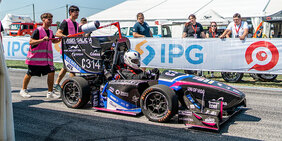The first edition of the Virtual AutoX Competition brought the excitement of Formula Student autocross into the virtual world, giving student teams the opportunity to test their engineering skills in a fully simulated environment. Using CarMaker, participants developed and fine-tuned their race cars on the digital twin of the competition track – combining creativity, technical expertise, and driving skills.
Competition highlights
From August 12 to 14, 2025, teams from across Europe competed head-to-head in the simulator. Following the official competition, simulators remained open until August 16, allowing drivers, team members, and even spectators to experience virtual racing firsthand.
The event concluded with outstanding performances across both combustion (CV) and electric vehicle (EV) categories:
Combustion vehicle (CV)
1st place: YTU Racing, driver Umut Kocayigit – 45.374 s
2nd place: Race-ing Dortmund, driver Markus Dec – 45.655 s
3rd place: BME Motorsports, driver Adam Pinczes – 46.015 s
Electric vehicle (EV)
1st place: TUG Alumini, driver Markus Pleschberger – 42.875 s
2nd place: Arrabona Racing Team, driver Kristóf Nagy – 43.612 s
3rd place: FSB, driver Lovro Vucetic – 43.633 s
The winners were officially recognized during the FSAA closing ceremony, where the Virtual AutoX Award was presented to the fastest drivers in each category.
Why it matters
- Lower entry barriers for teams by reducing costs and logistics
- Faster development cycles through rapid, safe, and virtual testing and iteration
- A platform for innovation in autonomous driving and future mobility
Looking ahead
For students, the Virtual AutoX Competition was not only an engaging challenge but also a valuable learning opportunity to explore simulation-driven development. For IPG Automotive, it represented a step toward further integrating virtual validation into motorsport education – supporting the next generation of engineers as they shape the future of mobility.
